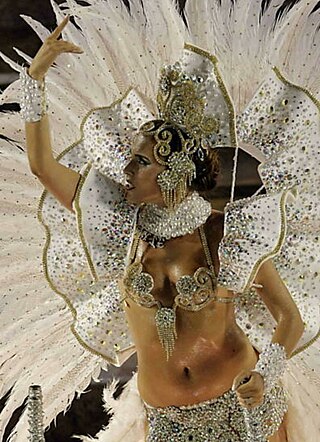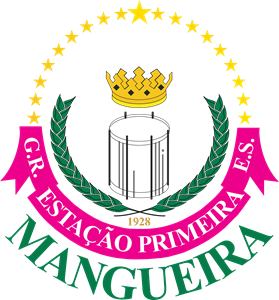
Samba is a name or prefix used for several rhythmic variants, such as samba urbano carioca, samba de roda, amongst many other forms of samba, mostly originated in the Rio de Janeiro and Bahia states. Samba is a broad term for many of the rhythms that compose the better known Brazilian music genres that originated in the Afro-Brazilian communities of Bahia in the late 19th century and early 20th century, having continued its development on the communities of Rio de Janeiro in the early 20th century. Having its roots in Brazilian folk traditions, especially those linked to the primitive rural samba of the colonial and imperial periods, is considered one of the most important cultural phenomena in Brazil and one of the country symbols. Present in the Portuguese language at least since the 19th century, the word "samba" was originally used to designate a "popular dance". Over time, its meaning has been extended to a "batuque-like circle dance", a dance style, and also to a "music genre". This process of establishing itself as a musical genre began in the 1910s and it had its inaugural landmark in the song "Pelo Telefone", launched in 1917. Despite being identified by its creators, the public, and the Brazilian music industry as "samba", this pioneering style was much more connected from the rhythmic and instrumental point of view to maxixe than to samba itself.

The music of Brazil encompasses various regional musical styles influenced by European, American, African and Amerindian forms. Brazilian music developed some unique and original styles such as forró, repente, coco de roda, axé, sertanejo, samba, bossa nova, MPB, gaucho music, pagode, tropicália, choro, maracatu, embolada, frevo, brega, modinha and Brazilian versions of foreign musical styles, such as rock, pop music, soul, hip-hop, disco music, country music, ambient, industrial and psychedelic music, rap, classical music, fado, and gospel.

Axé is a popular music genre originated in Salvador, Bahia, Brazil in the 1980s, fusing different Afro-Caribbean genres, such as marcha, reggae, and calypso. It also includes influences of Brazilian music such as frevo, forró and carixada. The word Axé comes from the Yoruba term àṣẹ, meaning "soul, light, spirit or good vibrations". Axé is present in the Candomblé religion, as "the imagined spiritual power and energy bestowed upon practitioners by the pantheon of orixás". It also has ties with the Roman Catholic Church and the Lenten season, which represents the roots of Bahian Carnival.

The Carnival of Brazil is an annual festival held the Friday afternoon before Ash Wednesday at noon, which marks the beginning of Lent, the forty-day period before Easter. During Lent, Roman Catholics and some other Christians traditionally abstained from the consumption of meat and poultry, hence the term "carnival", from carnelevare, "to remove meat."

A samba school is a dancing, marching, and drumming club. They practice and often perform in a huge square-compounds and are devoted to practicing and exhibiting samba, an Afro-Brazilian dance and drumming style. Although the word "school" is in the name, samba schools do not offer instruction in a formal setting. Samba schools have a strong community basis and are traditionally associated with a particular neighborhood. They are often seen to affirm the cultural validity of the Afro-Brazilian heritage in contrast to the mainstream education system, and have evolved often in contrast to authoritarian development. The phrase "escola de samba" is popularly held to derive from the schoolyard location of the first group's early rehearsals. In Rio de Janeiro especially, they are mostly associated with poor neighborhoods ("favelas"). Samba and the samba school can be deeply interwoven with the daily lives of the shanty-town dwellers. Throughout the year the samba schools have various happenings and events, most important of which are rehearsals for the main event which is the yearly carnival parade. Each of the main schools spend many months each year designing the theme, holding a competition for their song, building the floats and rehearsing. It is overseen by a carnavalesco or carnival director. From 2005, some fourteen of the top samba schools in Rio have used a specially designed warehouse complex, the size of ten football pitches, called Samba City to build and house the elaborate floats. Each school's parade may consist of about 3,000 performers or more, and the preparations, especially producing the many different costumes, provide work for thousands of the poorest in Brazilian society. The resulting competition is a major economic and media event, with tens of thousands in the live audience and screened live to millions across South America.

Los Hermanos is a rock band from Rio de Janeiro, Brazil. The group was formed in 1997 by Marcelo Camelo (vocals/guitar), Rodrigo Amarante (guitar/vocals), Rodrigo Barba (drums), and Bruno Medina. Currently they are on an extended hiatus, performing some concerts sporadically.

The Sambadrome Marquês de Sapucaí is a purpose-built parade area built for the Rio Carnival in Rio de Janeiro, Brazil. The venue is also known as Passarela Professor Darcy Ribeiro or simply the Sambódromo in Portuguese or Sambadrome in English. It is located in the downtown area of Cidade Nova in Rio de Janeiro, and is the place where samba schools parade competitively each year during the Rio Carnival. The parades attract many thousands of Brazilians and foreign tourists each year, and the structure is also used as a multi-purpose performance venue. The structures of the Sambadrome were designed by the architect Oscar Niemeyer (1907–2012), and represent his first major work after the end of the Brazilian dictatorship of 1964–1985.

The Carnival in Rio de Janeiro is a festival held every year before Lent; it is considered the biggest celebration of Carnival in the world, with two million people per day on the streets. The first Carnival festival in Rio occurred in 1723.
Carnival blocks, carnaval blocos or blocos de rua are street bands that mobilize crowds on the streets and are the main popular expression of Brazilian Carnival. These parades fall under the term "street carnival", and happen during a period of about one month, beginning before and finishing after Carnival. Blocos usually perform Brazilian rhythms, such as marchinha, samba, frevo, maracatu, and axé.
"Manhã de Carnaval", often referred to as "Black Orpheus", is a song by Brazilian composer Luiz Bonfá and lyricist Antônio Maria.

Bahian Carnival is the annual carnival festival celebrated in the Brazilian state of Bahia, mainly in its capital, Salvador. The event officially lasts for six days, beginning on the Thursday before Ash Wednesday and concluding on Ash Wednesday at noon. The term may also be used to comprise related events that happen immediately before or after, extending the duration for up to twelve days.
Samba-reggae is a music genre from Bahia, Brazil. Samba reggae, as its name suggests, was originally derived as a blend of Brazilian samba with Jamaican reggae as typified by Bob Marley.

The Grêmio Recreativo Escola de Samba Portela or Portela for short, is a traditional samba school, founded in 1923, in Rio de Janeiro, Brazil. The school has the highest number of wins in the top-tier Rio parade, with 22 titles in total, including the 2017 Carnival parade.
The Grêmio Recreativo Escola de Samba Beija-Flor is a Samba school headquartered in the municipality of Nilópolis, Baixada Fluminense, in the state of Rio de Janeiro, Brazil.

Grêmio Recreativo Escola de Samba Estação Primeira de Mangueira, or simply Mangueira, is a samba school in Rio de Janeiro, Brazil. The school was founded on April 28, 1928, by Carlos Cachaça, Cartola, Zé Espinguela, among others. It is located in the Mangueira neighborhood, near the neighborhood of Maracanã.

Marcelo de Souza Camelo is a Brazilian composer, singer, guitarist, and poet. He is best known as composer and lead guitarist of the Brazilian band Los Hermanos. Since the end of the band, he continues composing for many interpreters, mainly Maria Rita and Ivete Sangalo. In 2008, his first solo CD, "Sou", was released.
Marchinha is one of several genres of music typical of Brazilian Carnival in Rio de Janeiro and Southeast Region of Brazil. The other main carnival genres are: samba-enredo, frevo, maracatu and Axé music.

The Ensaios da Anitta are a series of live shows performed by singer Anitta, aimed at celebrating the pre-Carnival season in Brazil. Launched in January 2019, these events take place annually in January and February, traveling through various Brazilian cities such as Rio de Janeiro, São Paulo, Salvador, and Belo Horizonte. These shows were conceived by Anitta as a way to energize her audience for her Carnival street party, the "Bloco da Anitta", offering a mix of live music, dance, and themed performances.
Bloco da Anitta, previously Bloco das Poderosas, is a Carnival street party from Rio de Janeiro and Salvador, but it has also paraded in other cities, created by the Brazilian singer Anitta. On January 14, 2016, the bloco was officially launched in Rio de Janeiro during its first rehearsal.

Fundição Progresso is a cultural center and music venue in the neighborhood of Lapa, in Rio de Janeiro, Brazil. It is located in the building of a former stove factory, Fábrica de Fogões Progresso.












